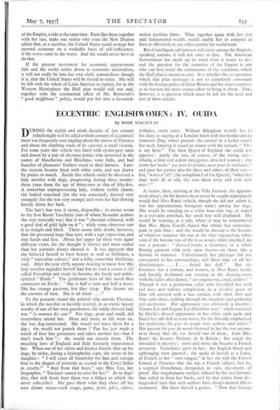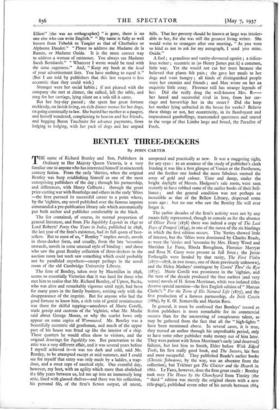ECCENTRIC ENGLISHWOMEN: IV. OUIDA
By ROSE MACAULAY The hair's hue was, it seems, disputable ; its owner wrote to the first Baron Tauchnitz (one of whose favourite authors she very naturally was) that it was "chestnut coloured, with a good deal of gold light on it " ; while some observers saw it as straight and black. There seems little doubt, however, that she possessed large blue eyes, with a rapt expression, and tiny hands and feet. About her upper lip there were again different views, for she thought it shorter and more curled than her portraits always showed it. It was apparent that she believed herself to have beauty as well as brilliance, a wide "masculine culture," and a lofty, somewhat Shelleyan, soul. After the year 1878, anyone desiring to know how this lady novelist regarded herself had but to read a roman a clef called Friendship and study its heroine, the lovely and noble- spirited " Etoile." The gentleman hero of this novel thus comments on Etoile : "She is half a saint and half a muse. She has strange passions, but they sleep. Her dreams are the enemies of men. She is all mind . . ."
To the peasants round the palatial villa outside Florence, in which the novelist so lavishly resided, in an exotic luxury worthy of one of her own guardsmen, the oddly-dressed lady was " la-mamma del cani." For dogs, great and small, did everywhere attend her. More and more, as life went on, she was dog-intoxicated. She would not leave them for a day ; she would not punish them (" Pan has just made a wreck of four fine geraniums and taken another hat—but I don't touch him ") : she would not muzzle them. The Muzzling laws of -England and Italy furiously impassioned her. When one of her oldest and kindest friends shut up his dogs, by order, during a hydrophobia scare, she wrote to his daughter : "I will cease all friendship for him and consign him to the disgust of posterity as second to the Cenci father in cruelty." "And from that hour," says Miss Lee, her rbiographer, " Tassinari ceased to exist for her." As to dogs' diet, that rich foods hurt them was a fallacy to which she never 1113scribed. She gave them what they chose off her own dinner menu—rich soups, game, petits peites, salmis, timbales, sweet cakes. William Allingham records her i his diary as staying at a London hotel with her mother and an immense Dog, whose portrait she carried in a locket roun I her neck, handing it round at dinner with the remark, " T his is my hero." The then Queen of England she could 'tat approve : partly she was, of course, of the wrong sex- (Ouida, a firm and ardent misogynist, detested women ; she wrote her books" pas pour les femmes, mais pour les militaires," and gave her parties also for these and others of their sex)— but, "worst of all" (she complained of the Queen), "when her dogs were ill or old, she sent them away and took new ones ! "
A visitor, then, arriving at the Villa Farinola (by appoint- ment always, for his hostess must never be caught unprepared) would find Miss Rame (which, though she did not admit it, was her unpretentious bourgeois name) among her dogs. She would be standing on a white bear-skin rug, or seated in a red-satin armchair, her small feet well displayed. She would be wearing, as a rule, white (it may be remembered that Miss Marie Corelli shared this whim) but sometimes pink or pale blue ; and she would be dressed as the heroine of whatever romance she was at the time engaged on, white satin if the heroine was of the beau monde, white muslin if she was a peasant : "dressed (wrote a Countess) in a white flowing garment with wide open sleeves—in short, like a heroine of romance. Unfortunately her physique did not correspond to her surroundings, and these only set off her disadvantages . . . I . . . found hcr dull." But the Countess was a woman, and women, as Miss Rattle loudly and harshly declaimed one evening in the drawing-room with the ladies after dinner," are ungenerous, cruel, pitiless ! " Though it was a gentleman caller who described her with red nose and tallowy complexion, in a décolleté gown of blue silk covered with a lace curtain, with short skirt and blue satin shoes, walking through the meadows and gathering red anemones. Her appearance was obviously a disaster : Vernon Lee and Eugene Lee-Hamilton were" much exercised by Ouida's absurd appearance in her white satin garb, and found her talk dull or even worse, for she liberally emphasised her preference for gens du monde over authors and artists." Her passion for gens du monde fostered in her the not uncom- m3n theory that she was herself one of them ; from Miss Rame she became Madame de la Ram& ; her origin she shrouded in mystery; more and more she became a French aristocrat. Frenchness grew in her ; her English blood and upbringing were ignored ; she spoke of herself as .a Latin, of French as her "own tongue," at last she told the French Consul at Florence that she was a French subject, but he, a sceptical Frenchman, demanded, in vain, documents of proof. Her megalomania swelled, inflated by the vast fortunes that rolled in from her books, and by that praise from dis- tinguished men that such authors have always seemed able to command. She knew herself a genius. "Now that George Elliott" (she was no orthographer) "is gone, there is no one else who can write English." "My name is fully as well known from Tobolsk to Tangier as that of Cherbaliez or Alphonse Daudet" "Please to address me Madame de la Ramee, or Madame Ouida. It is the more correct way to address a woman of eminence. You always see Madame Sarah Bernhardt." "Whatever I wrote would be read with the same eagerness." And, "Keep my book at the head of your advertisement lists. You have nothing to equal it." (But I am told by publishers that this last request is less eccentric than they could wish.) Stranger were her social habits ; if not pleased with the company she met at dinner, she sulked, left the table, and rang for her carriage, lying silent on a sofa till it came.
But her hey-day passed ; she spent her great fortune recklessly, on lavish living, on rich dinner menus for her dogs, on going continually to law. She buried her mother as a pauper, and herself wandered, complaining to heaven and her friends, and begging Baron Tauchnitz for advance payments, from lodging to lodging, with her pack of dogs and her unpaid bills. That her poverty should be known at large was intoler. able to her, for she was still the greatest living writer. She would write to strangers after one meeting, "As you were so kind as not to ask for my autograph, I send you mine. Ouida."
A fool ; a grandiose and vanity-devoured egotist ; a ridicu- lous writer; eccentric in (as Henry James put it) a common, little way. Yet she would not cut her trees because she believed that plants felt pain ; she gave her meals to her dogs and went hungry ; all kinds of distinguished people were her enemies and friends ; and Max wrote on her an exquisite little essay. Florence still has strange legends of her. Did she really drag the well-known Mrs. R---! her hated and successful rival in love, from her car- riage and horsewhip her in the street ? Did she keep her mother lying unburied in the house for weeks? Believe these things or not, her eccentricity, in its flamboyant and impassioned gambollings, transcended queerness and soared to the verge of that Limbo large and broad, the Paradise of Fools.















































 Previous page
Previous page